Archives
The Lone Drainer Recipe collection
It’s the second month of the New Year and we’re all still full of good intentions.
I, The Lone Drainer, the fastest plumber in the Eastern suburbs, hereby announce my New Years Resolution: I will become a better cook. I am committing in print in the hope that my public announcement will help me stick to the program.
Here’s how it will work:
Every week, I will publish a new recipe, fully tried and tested in The Lone Drainer Coogee kitchen and stomach. I’m aiming for easy, fast and not too many ingredients. And something that won’t make me fat. I want to be a fit, healthy fifty year old. (Ed: who are you kidding Dave? Rumour has it you’re closer to sixty already!)
It won’t always be a recipe, sometimes it will just be a meal idea, suitable for a man to make. (OK, sexist, I know. I’ll rephrase that. What I mean is suitable for me, a mere male without a lot of cooking skills, but certainly a man who likes to eat well).
Here is No 1 Recipe, a sample of my ‘easy-after-a-hard–days-work–plumbing meal’ idea:
Go to the supermarket.
Buy a bag of mixed salad leaves, a bottle of bread and butter pickles, and a piece of salmon.
Put two potatoes and two carrots on to boil. (Good plumbers need carbs. We work hard and burn a lot of energy).
Spread the salad leaves on a plate. Pour a tablespoon of olive oil on the leaves. (Uncooked olive oil is good for keeping cholesterol down).
BBQ the salmon. Or cook it in a heavy cast iron frypan. Six and two minutes on a gas stove.

Put the salmon on top of the leaves. Put the now cooked potatoes and carrots next to the salmon on the plate . Add a couple of dill pickles. There is dinner. Four vegetables, fish for protein and a few carbs for energy. Twenty minutes tops.
Read our blog. Cook my food. Admire our plumbing.
Gas heater time again
Winter is coming to Sydney.
With some much needed rain approaching as we head towards June 1st, it’s time to go looking for some indoor heating.
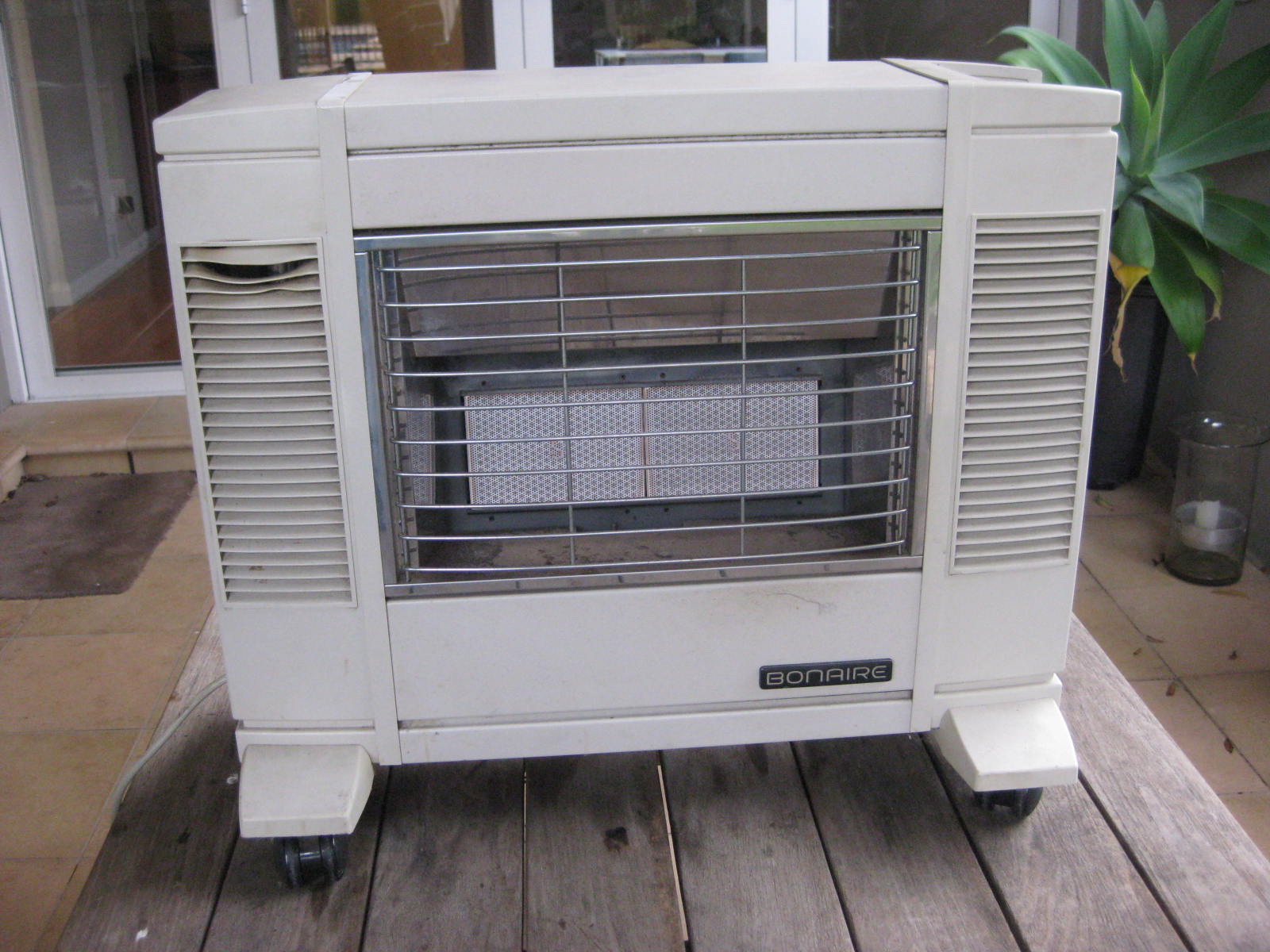
If you haven’t run your gas heater since last winter, please dust it and ensure the bayonet fittings are well lubricated before inserting the heater hose. Don’t forget to check for leaks. Soapy water is one way to do it.
If you’re in Sydney and not sure about your gas appliances – Call Us! 02 9664 4990
Help! Where does my Hot Water turn off?
“HELP!“
“My water heater is spitting out hot water and steam. Can you get over here Urgently?” “I don’t know how to turn it off and I think it’s going to explode!”
Monday morning brought a call from Deborah in Randwick. It sounds like a job for The Lone Drainer ……and Pronto.
Of course we were able to rescue Deborah. We replaced the water heater and the gas and water shut-off valves that controlled the unit. But, how many people don’t know how to turn off their water heater?
The image below shows where to shut off the water and gas supply to the heater. Why don’t you practice turning the water heater off when it isn’t urgent?
If you need help Call us 02 9664 4990
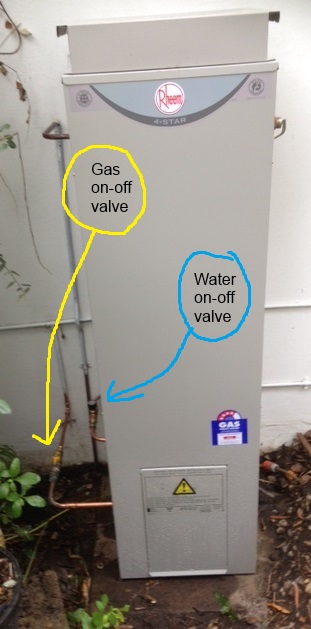
3 Tips for Healthy Hot Water
Who had a cold shower this morning?
Winter makes the need for hot water a high priority. If you think your heater is under performing do this quick water heater health check.
1. Check the colour of your water. If its brown, your water heater has a buildup of sediment or rust.
2. Check your Temperature and Pressure Relief valve (like the one shown below), pull the lever; it should spurt out water till you let go of the lever. If it dribbles afterwards, it needs attention.
3. Does the stop valve work? Try turning it off, test the water at your hot taps and turn it back on. Ideally it should stop the water flow through the heater.
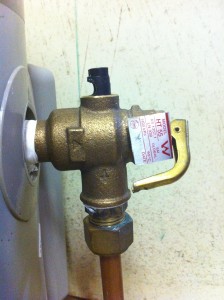
Whether your water heater is gas or electric, storage or continuous, check it regularly.
If your hot water runs out get your friendly plumber to check it over
Common pipelines; easements, ownership and liability #2

One recurring topic of 2010 is the Ownership and liability of common water, sewer and gas pipes.
When we send out an emergency response team to a ruptured gas or water pipeline or an overflowing sewer, the first thing our team thinks about is rescuing the property under threat. Often, it is after the emergency that ownership and liability of the problem are hotly debated.
This series of 3 blog posts is aimed at clarifying some of that debate.
Our friends at the Law Reform Commission have helped to clarify this interesting subject and in part it reads:
A user of a service may attempt to disconnect the joint service and force other users of the service to bear the cost of a direct connection to the main service. Such action will however, be illegal unless conducted in accordance with the Water Board Act 1987 (Water Board (Plumbing and Drainage ) Regulation 1989),2 or a court order declaring that the common user of the service has a right to discontinue the service.
The creation of permanent rights of access is seen as a means of avoiding problems of access in respect of utility services, and applications have been made to the courts over the years to have access to and over utilities such as water pipes and sewers recognised as easements of necessity. The courts have, however, gone to considerable lengths to hold that although such an easement may be considered by a landowner to be essential for the reasonable enjoyment of property, it is not an easement of necessity, because at law, easements over such services are not considered necessary to the land itself.
Although DP 22 raised the possibility of statutory recognition of these “trespassing” services as a means of rectifying the problem, the Board of Surveyors pointed out in their submission that few authorities know with any exactitude the location of their service lines. Consequently, the Board of Surveyors opposes the creation of statutory easements over them until such time as they are properly defined on title. The Commission agrees that such a step may be expensive and premature at this stage. It would seem desirable however, that steps are taken in the long term by the relevant authorities to locate such services, properly record them and establish the appropriate rights over them.
My car is powered by sewage
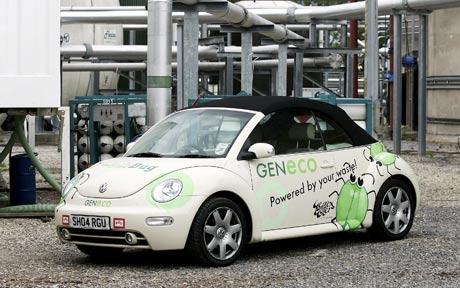
Methane powered beetle
This post was brought to my attention by the ever vigilant Richard Piper. When you ring our office for help you may speak to him. Tell him you enjoyed this post; I did!
Sewage powered VW Beetle hits the road in Bristol! A Volkswagen Beetle powered by gas from sewage has taken to the road for the first time in Britain.
This converted Beetle car runs on methane gas. The Bio-Bug was launched on Thursday by Wessex Water, which is generating methane from human waste at a sewage treatment works near Bristol.
The company claims the prototype is able to cover 10,000 miles annually on the waste from 70 households.
If the trial proves successful, Volkswagen will consider converting some of its fleet of vehicles to run on biogas.
Mohammed Saddiq, of GENeco, a Wessex Water subsidiary which runs the biogas plant at Avonmouth, said: “Our site has been producing biogas for many years, which we use to generate electricity to power the site and export to the National Grid. With the surplus gas we had available we wanted to put it to good use in a sustainable and efficient way. We decided to power a vehicle on the gas, offering a sustainable alternative to using fossil fuels which we so heavily rely on in the UK.
“If you were to drive the car you wouldn’t know it was powered by biogas as it performs just like any conventional car. It is probably the most sustainable car around.”
The Anaerobic Digestion and Biogas Association said the launch of the Bio-Bug proved that biomethane from sewage sludge could be used as an alternative fuel for vehicles.
Lord Rupert Redesdale, the association’s chairman, said: “This is a very exciting and forward-thinking project demonstrating the myriad benefits of anaerobic digestion (releasing energy from waste). Biomethane cars could be just as important as electric cars.”
Last month Volkswagen announced plans to conquer the green market with a new generation of hybrid and electric cars.
What do you know about your gas supply?
Winter starts tomorrow and if gas is your preferred method of heating then read on…
Natural gas is a great resource to have in any home for ovens, cooktops and hot water heating. However leaks in a high pressure gas line can be extremely dangerous especially if they go unnoticed or are allowed to continue unchecked. The massive explosion in Bondi Junction last year is an example of how horrible a gas blast can be.
If you live in a building with multiple gas meters, it is really important to know where your gas meter is and how to turn it off. Make sure all the gas meters in your building are labelled or numbered clearly, so that in the event of an emergency, you can turn your gas off safely.
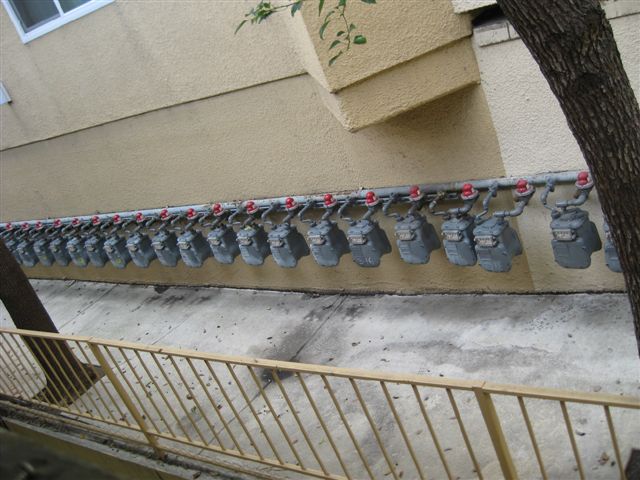
Which gas meter is mine?
Here are some pointers to detect gas leaks early so that appropriate measures can be taken to avoid major damage.
- If you suspect a gas leak, mix some bubbles using detergent with water, and cover the suspect area. If bubbles expand, you have found the leak.
- Don’t ignore a gas leak. Gas can be dangerous! Not to mention your bills will be increased.
- Disconnect your plugged-in gas heater in summer.
- When reconnecting the heater in winter and the bayonet is difficult to plug in, it is probably dusty. Dust and lubricate the connection, then try again.
- Don’t mess around with gas. If you are not sure don’t touch!
If you are not sure when it comes to a gas pipe problem, always call a licenced plumber and gasfitter.
7 easy ways to extend the life of your Water Heater
Have you found yourself in a situation where its winter and you head home for a shower after work, or after a rugby or netball training session, turn on the hot water tap and the water is cold?
There are many plumbing fixtures around your home, the bath or hand basin, kitchen sink, of course the toilet. Some homes, offices and small business have multiple toilets, showers and basins.
As we move into the cooler months the average hot water heater becomes more important for all these plumbing fixtures to work.
Its easy to take these often ignored assets in your home or office for granted, but some simple actions will prolong the life of your storage water heater.
Replacing your hot water heater can usually be unexpected and sometimes expensive, but in today’s fast moving world we can easily ignore this vital cog in our daily routine.
So be sure you are aware of the following:
- Where is your water heater? You need to know where it is!
- Is it gas or electric? You need to know!
- Can you turn off the gas or electricity?
- Can you turn off the water supply to your heater? Try it! Check this valve or tap works
- Is it a mains pressure storage heater or instant (continuous)?
- If it is mains pressure, have you released the Temperature and Pressure Relief valve (T&PR valve)?
- Keep the area around this heater clean and clear. Keep long grass, paint cans etc. well clear.
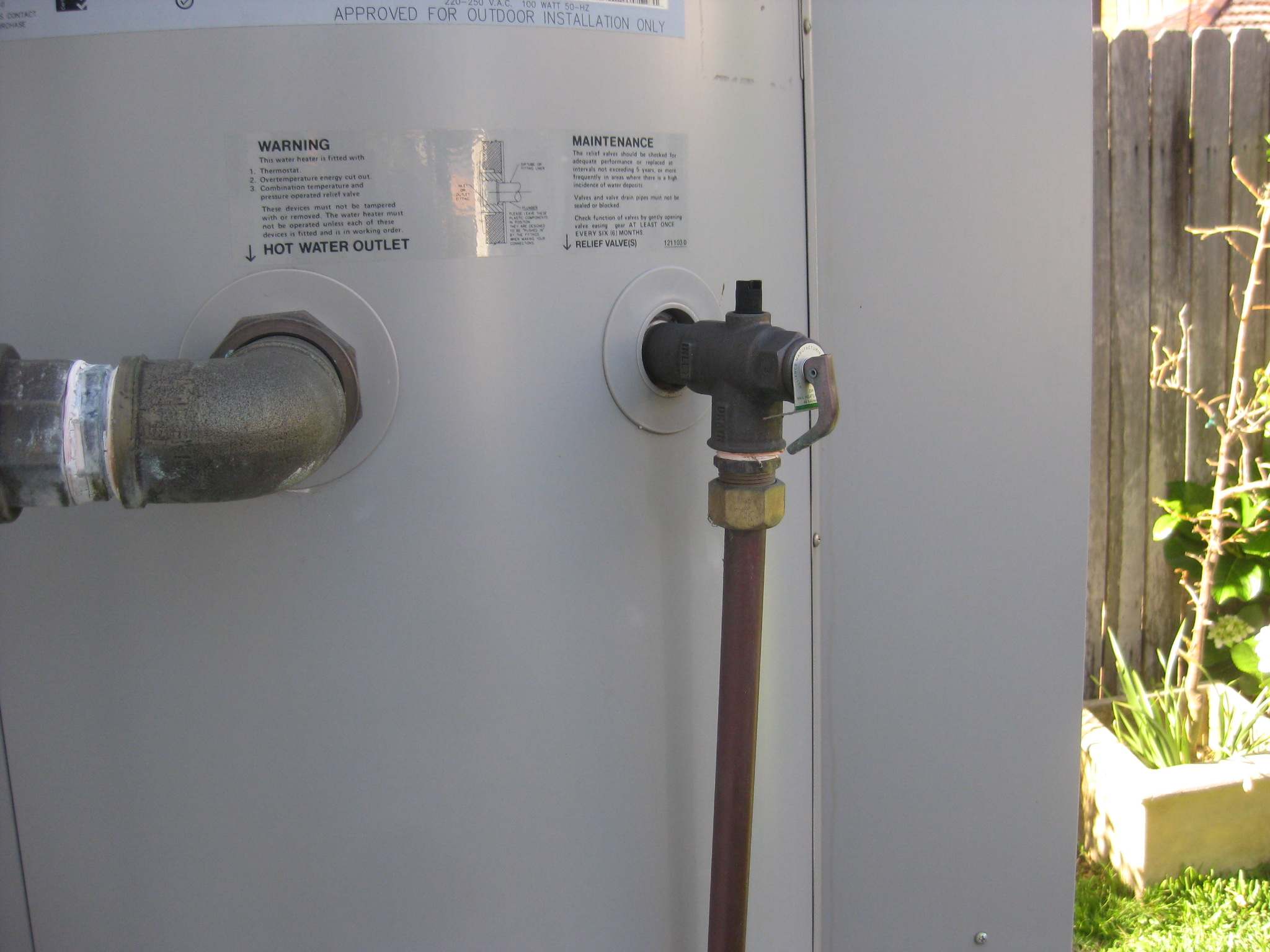
T&PR valve on mains pressure external gas water heater
See the “hook” on the Temperature and Pressure Relief valve, lift it and hold it up for 30 seconds at least every three months. If this is working properly, it will discharge the hot water whilst you hold up the hook, then stop when you let it go. It is normal for it to discharge water while the heater is heating. Then the water should stop! Be careful the hot water doesn’t scald you.
Our water heater is a friend, if you are ever unsure about how your water heater is performing, or have any questions about any of the things we have outlined here, contact a professional plumber for guidance.
Remember to engage a licensed plumber to attend to your hot water heater.
https://www.thelonedrainerandpronto.com.au/hot-water-services.html
How to Prolong the Life of Your Mains Pressure Hot Water Heater
The lifespan of a water heater is about eight to twelve years, depending on whether it is inside or out, near the ocean, or you carry out simple maintenance procedures. Modern tanks are lined with steel, and this lining can break down over time.
Here are some tips to prolong the life of your mains pressure hot water heater.
- Installing a second anode rod prolongs the life of the water heater. The anode rod undergoes corrosion as time moves on and collects this corrosion in order to prevent so much corrosion in the tank.
- A pressurised system needs a Temperature and Pressure Relief valve to be working effectively in order to prolong the life of the water heater. As water heats, it expands and needs somewhere to go. A T&PR valve will prevent stress on the water heater and the hot water plumbing system by taking the discharge.

Ease this valve regularly
- Annual flushing of an older tank will help keep it working and prevent sedimentary build-up inside the tank. Newer tanks are often self-cleaning; they may cost more but are able to last for many years to come.
- Very high water pressure can damage your appliances and cause the water heater to wear out too early. Installing a pressure limiting valve regulates system pressure and reduces the wear and tear on your hot water plumbing and your appliances.
- Scaling is a big problem for water heaters in areas where the public water systems have excess mineral contents. In many instances a water softener is the answer to this problem. The water softener reduces wear and tear on the water system and helps your soap suds up better.
Should your water heater stop working for you, be sure to call in emergency plumbing services and restore the hot water supply back in your house. The Lone Drainer and Pronto plumbing services have an emergency plumbing services number where you can reach a professional plumber twenty four hours a day to take care of any problem you may be having with the plumbing. NEVER attempt to do it yourself as you do require a qualified plumber to assist you in this situation.
Follow the suggestions mentioned and prolong the life of your mains pressure hot water heater. You want the hot water heater in your home or business to perform exactly as it should at all times. By taking care of the water heater and making sure you cover most of these things, you will save yourself the expense of replacing a whole system or the frustration of not knowing just what to do when the whole thing seems to be under performing or even leaking.
It is never nice to have a plumbing emergency, but in the unfortunate circumstance that you do, it is good to know that emergency plumbing services are available. Many reputable companies will come back the next day with a follow up to make sure that everything is working the way it is supposed to, as well as to make sure that there are no more immediate problems that could potentially shut your water off for an extended period of time.
When you have to choose a regular plumber, be sure that they have plumbing services for any emergency and reasonable charges for their plumbing services. They should also give you a price for the job upfront, before they start.
https://www.thelonedrainerandpronto.com.au/hot-water-services.html
What Will Happen If I Ignore that Gas Leak?
Many people have no clue what natural gas smells like, so how can they recognise if they have a gas leak? Chemical compounds are placed in the natural gas to give it an odour which often smells like rotten eggs. This odour ensures that when a person smells it, they would be alerted to a problem. People trained in utility services, including plumber services, have the required equipment and have been taught skills to recognise and locate leaks in a gas line.
If you ignore that gas leak and do not call plumbing services Sydney, then you are placing yourself and your family at risk of being caught in a house that in the worst case, may blow up. DO NOT ignore that gas leak. It could injure you and your loved ones.
It is VERY important to know where your gas meter is, and how to turn it off. Make a point of finding this out and ensure that everyone in your household over 15 knows where it is.
When you do notice a leak, CALL, not email, your local service area to notify them of a problem. Get everyone out of the house and do not return until someone who is licensed to provide professional plumbing services says it is safe to re-enter your home.
Recognise leaks by the smell or a hissing sound, off colour vegetation in a normally green and lush area, flames if the leak has ignited, dirt coming up from an opening in the ground, or bubbles showing up in a flooded area.
When you react, be sure not to panic children or older adults. Panic only creates more problems. Have a pre-planned escape route and make sure everyone follows the plan in a calm and orderly manner.
When leaving the area, do not turn switches for lights or appliances on or off. They could send out sparks and cause an explosion.
Don’t smoke.
Leave the area and let professionals solve the problem.
Never ignore a leaky gas line inside or outside your residence.
Finding plumbing services Sydney, which will conduct a few simple tests to locate or dismiss a leaky gas fear, is not difficult to do if you look in the phone book for plumber services.
Natural gas is very hard to detect because it has no odour that will alert you of a problem. Although gas companies have put a chemical compound in the gas so that it can be detected, usually a gas leak is something that happens slowly and is not noticeable. A regular check of gas lines around or in your house by an individual that is licensed to provide professional plumber services should be done periodically so that any leaks that might develop can be caught before it becomes dangerous.
Contact plumber services Sydney and leave the area until professionals can tell you it is safe to return.
Take precautions, ensure you have a plan in place and NEVER ignore a gas leak.
What’s that smell? A pig of a gas leak
As licensed gasfitters, we have electronic equipment that detects gas leaks from all sorts of gas appliances, gas pipelines and gas meters, but this one is unusual….
A big pig with flatulence sparked a “gas emergency” near the Victorian city of Bendigo last week when the smell wafting from a 120kg oinker sparked fears of a potentially dangerous gas leak.
Two CFA tankers and a dozen firefighters responded to a nightime callout to search for the source of the suspected gas leak on a rural property at Axedale, east of Bendigo.
The ever alert firemen soon sniffed out the source; a pet sow startled from her snooze. “She got very excited and she squealed and farted and squealed and farted” said Fire Chief Peter Harkins.
Chief Harkins said the family who owned the pig had done the right thing by reporting a suspected gas leak.
Are you Ready for Spring?
Spring is here and summer is just around the corner! This means footy finals, Spring Racing and cricket! You don’t have to change your sleep habits to watch the games, and you can start planning a good old BBQ with family and friends.
This also means that people will want to get their backyard into shape, and the NSW State Government is helping with this by offering rebates for some water saving devices. More information about this can be found at http://www.environment.nsw.gov.au/rebates/
Here are some simple ways to save water around the house but still keep your garden looking its best during the hot summer:
– Install a timer irrigation system. Drip lines are effective as they deliver water straight to the plant root system and largely avoid water loss through evaporation.
– Use mulch throughout your garden beds to further trim down evaporation.
– Install a trigger nozzle. They save water by shutting off a hose between watering different plants in the garden.
– Install a rainwater tank to capture otherwise wasted rain water that runs off the household roof. The NSW Government provides rebates of up to $1500 for such tanks.
– Think about installing rain and soil sensors which prevent irrigation systems from operating unnecessarily after rainfall.
Also if you are installing a new BBQ, always remember to use a licensed gasfitter!
Danger of Gas Room Heaters
We opened the heater to have a good look inside and it appeared that the motor had overheated and had started to melt the casing. It was a disaster waiting to happen!
Fortunately there was a tradesman working next door who quickly came on the scene and disconnected the gas appliance from the gas supply, preventing a potential fire!
As the days get colder and we turn to our gas room heating appliances to keep us warm, please dust them and make sure you can disconnect them from your gas bayonet fittings with ease.

Dangerous gas room heater

